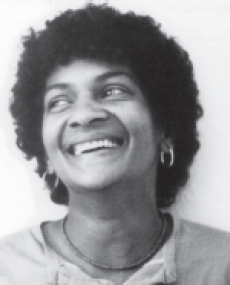
The youngest of nine children, Ruth Naomi Leon (who later started calling herself Tania) was born in a small town called Wellington in the Cape Province (now Western Cape) on 4 May 1945. Her mother, Elizabeth Sampson, was a domestic servant and her father, Frank Leon, was a factory worker and shopkeeper before starting a fish trade, which improved her family’s financial situation.
Although she was born during a time of great racial discrimination in South Africa, her parents kept her sheltered from the harsh reality of apartheid and the struggle that was taking place. As she got older, she started to become more aware of the repressive reality for Black people during that time. This, along with the fact that she could not live openly as a lesbian woman, forced her to leave South Africa in 1972 for Denmark.
Leon acquired her diploma in teaching at the Athlone Training School in Paarl, Western Cape, in 1961. In 1964 she got her diploma for physical education at the Zonnebloem Training School in Cape Town. When she moved to Denmark, she spent eight months working in a restaurant before moving to the Netherlands in 1973. While there she began studying as a nurse in the hospital of the Vrije Universiteit (VU) University, Amsterdam and graduated in 1976. It was during her studies there, living with other student nurses at the Uilenstede student complex in Amstelveen, that she was introduced to the feminists of the Vrouwenhuisje in de Pijp. She also started to become aware of her position as a Black woman living in the Netherlands and after returning home for a visit in 1976, shortly after the Soweto Uprising, Leon decided to get involved in the anti-apartheid struggle by joining the women’s group of the Anti-Apartheid Movement in the Netherlands as well as the Dutch branch of the African National Congress (ANC).
Leon continued to work at the VU hospital as a nurse until she graduated, specialising in obstetrics and gynaecology in 1979. After this, she attended the Social Academy CICSA (Central Institute for Christian Social Work) in Amsterdam and completed a course in social health education in 1982. In that same year in August, she started working as a district nurse at the Amsterdam Cross Association until 1985.
In 1986 she achieved her practical diploma in accounting and subsequently became a staff member at the Women and Informatics Foundation in Amsterdam until 1989. Furthermore, from August 1987 she lectured in accounting and office practice at the Women’s School of Informatics Amsterdam.
In November 1982, Leon co-founded the Mama Cash Foundation and was a board member from 1983 to 1984. A first of its kind in the world, the Mama Cash Foundation is an independent financing fund focused on helping women all over the world launch small-scale initiatives that give aid to the improvement and independence of women. Likewise, in1984, inspired by the African-American writer and professor Audre Lorde, Leon and three other women started the Black lesbian feminist organisation – Sister Outsider. This was conceived as a result of feeling marginalised from the existing, largely White lesbian movement. Through Sister Outsider, they organised parties and discussion evenings to give a platform to Black lesbians in the Netherlands.
After getting her Dutch citizenship in 1984, Leon obtained the right to vote for the first time in her life. However, she was still determined to help her fellow countrymen and women back home in South Africa. Hence, the following year she returned to South Africa with a friend for six weeks. Besides visiting family and friends, they also spoke to, among others, women from the United Women’s Organisation (UWO).
Leon also played a hand in establishing a Black and migrant women’s documentation centre called Flamboyant in1985, running until 1990. The purpose of Flamboyant was to create awareness and an understanding of the experiences of Black and migrant women in the Netherlands.
She founded the Study Fund for Black South African Women in 1986. This fund continues to open up opportunities for Black women today, supporting 25-30 young, underprivileged women every year to improve their lives through education.
Around 1990, Leon developed breast cancer, along with other health issues. She subsequently died in Nigtevecht, Utrecht on 15 August 1996 at the age of 51. She was buried in South Africa and was given a headstone by sculptor Berenice Witsen Elias. After her passing, the study fund she established became the Tania Leon Study Fund.
Due to all the groups and initiatives she was a part of, Leon is recognised for her work towards improving the position of Black and lesbian women in both the Netherlands and in South Africa. She is celebrated as being an activist who opposed all forms of discrimination, whether it was racial, religious, or against sexual orientation, she believed that if one fights against one injustice, then one has to fight against all injustices. Even though she became a Dutch citizen, this did not make her forget her birth country and she continued to fight against the apartheid government in the Netherlands.
In 2018 a feminist group took to the streets of the Netherlands and unofficially renamed several streets after esteemed women as a way to recognise the women for their contributions in their various fields. Leon was one of these commemorated women.